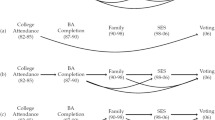Conclusion
A politician's preferences do matter. He is not simply a captured agent speaking only for his constituent's interests. Some latitude exists for him to shirk his responsibility to serve his constituents' interests and to cast votes consistent with his own personal ideology. More important to our understanding and modeling of voting behavior, shirking for ideological consumption is seen to increase with age once a threshold of about 53 years old is reached. Shirking is not a phenomena of the politicians' final term in office, rather it likely exists in every term and begins to increase significantly two terms prior to the expected horizon. Sixty percent of the sample of senators were seen to exhibit increasing ideological consumption with age.
Other studies have attempted to distinguish the investment and consumption components of ideological measures by more appropriately characterizing the constituent interest variables (Peltzman, 1984) or purifying the ideological variable (Kalt and Zupan, 1988; Kau and Rubin, 1979). Of course, one might always ask, are the variables now properly characterized and completely pure? This paper takes a different approach. It shows that the ideological measure, as an explanatory tool, increases in importance with age. Our explanation is that there is a true ideological component imbedded in the measure and politicians do, in fact, shirk their constituents' interests to engage in ideological consumption. Because an approaching horizon lowers its price, ideological consumption increases with age.
Similar content being viewed by others
References
Amacher, R.C., and Boyes, W.J. (1978). Cycles in senatorial voting behavior: Implications for the optimal frequency of elections. Public Choice 33: 5–14.
Barro, R.J. (1973). The control of politicians: An economic model. Public Choice 14: 19–42.
Goldfeld, S., and Quandt, R. (1973). The estimation of structural shifts by switching regressions. Annals of Economic and Social Measurement 2: 475–485.
Jensen, M.C., and Meckling, W.H. (1973). Rights and production functions: An application to labor-managed firms and codetermination. Journal of Business 52: 469–506.
Kalt, J.P., and Zupan, M.A. (1988). The apparent ideological behavior of legislators: Testing for principal-agent slack in political institutions. Journal of Law and Economics (forthcoming).
Kalt, J.P., and Zupan, M.A. (1984). Capture and ideology in the economic theory of politics. American Economic Review 74: 279–300.
Kau, J., and Rubin, P. (1979). Self-interest, ideology, and logrolling in congressional voting. Journal of Law and Economics 22: 365–384.
Lott Jr., J.R. (1987). Political cheating. Public Choice 52: 169–186.
McCormick, R.E., and Tollison, R.D. (1978). Legislators as unions. Journal of Political Economy 86: 63–78.
Peltzman, S. (1985). An economic interpretation of congressional voting in the twentieth century. American Economic Review 75: 656–674.
Peltzman, S. (1984). Constituent interest and congressional voting. Journal of Law and Economics 27: 181–210.
Peltzman, S. (1976). Toward a more general theory of regulation. Journal of Law and Economics 19: 211–240.
Porter, P.K., and Scully, G.W. (1987). Economic efficiency in cooperatives. Journal of Law and Economics 30: 489–512.
Stigler, G.J. (1971). The theory of economic regulation. Bell Journal of Economics and Management Science 2: 3–21.
Tullock, G. (1967). Toward a mathematics of politics. Ann Arbor: University of Michigan Press.
Author information
Authors and Affiliations
Rights and permissions
About this article
Cite this article
Davis, M.L., Porter, P.K. A test for pure or apparent ideology in congressional voting. Public Choice 60, 101–111 (1989). https://doi.org/10.1007/BF00149238
Issue Date:
DOI: https://doi.org/10.1007/BF00149238




